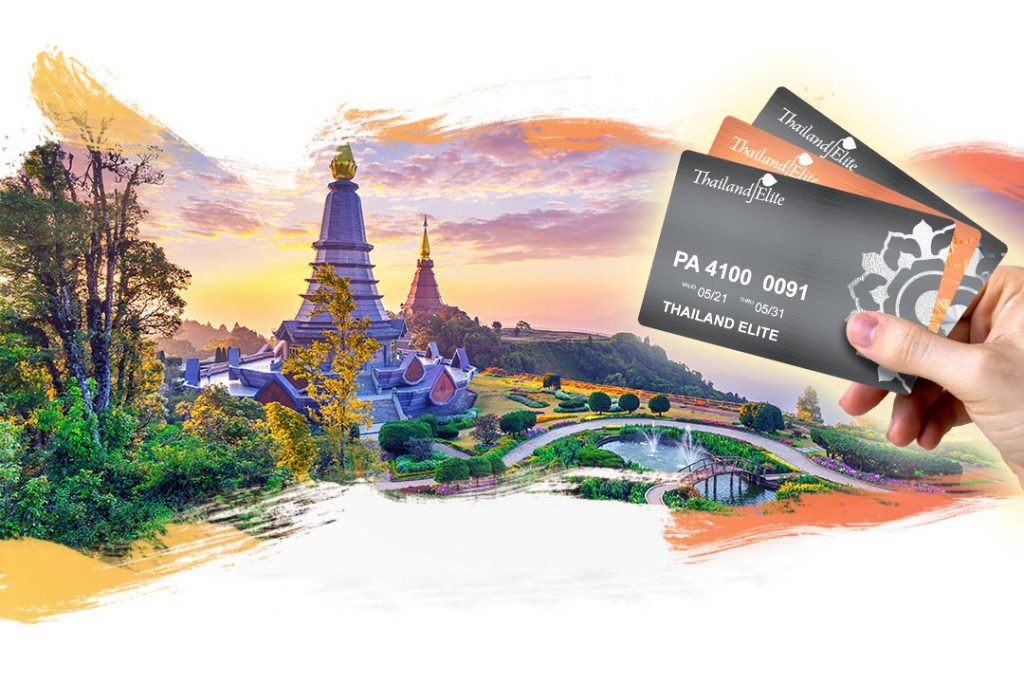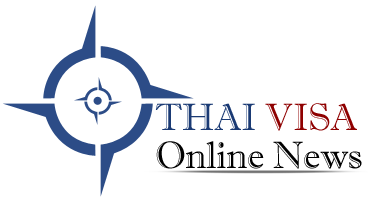Home

About Thai Visa News
Created in 2011, ThaiVisa News provides immigration information, immigration news, and travel guide and updates for people wishing to visit Thailand. The gateway to detailed information and requirements about Thai Visa application, whether researching travel opportunities, seeking information on travel restrictions, or looking for advice and assistance on how to move into Thailand. The comprehensive information of this website means that all answers to your immigration questions are at your fingertips.
Latest News
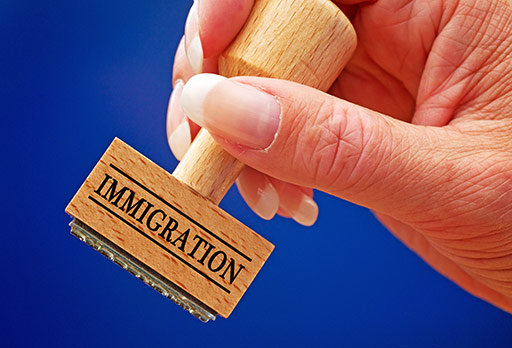
There are a variety of Thailand visas available that allow foreign nationals to visit, live, or work in Thailand. The chart below provides a general outline of the requirements for the Thai visa.
Unless the foreign national enters on a type of tourist visa waiver, all of the Thai visas require the foreign national to start the process at an overseas Thai consulate. The initial period of validity for a visa is generally one year with an approved stay of 30 days to one year after entry into Thailand. Applications for extensions of the visa varies depending on the type of visa and generally takes about one day.
| Type of Visa | Initial Visa Application | Validity of the Visa | Permit to Stay | Visa Extension | Place of Filing | Time Frame | Fees |
| Non-Immigrant "ED" Education Visa | Initial 90-day visa must be obtained from a Thai Consulate abroad (home country or nearby countries) | The visa must be used within 3 months | 90 Days after entry into Thailand | 1 year for an Accredited University and 90 days for Language School | Immigration office where the school is located | 1 Day | 1,900 baht |
| Non-Immigrant Visa "B" Employment | Initial 90-day visa must be obtained from a Thai Consulate abroad | Must enter Thailand within 3 months after the visa was issued | 90 Days after entry into Thailand | 1 Year Extension if Work Permit is Obtained | Submitted at the immigration office where Employer is located | 1 Day with 2 Visits to the Immigration Office | 1,900 baht |
| One-year Non-Immigrant Visa "B" | Application must be made in Home Country or the Country where the Company or Business is located | One Year | 90 Days after entry into Thailand | No extensions; but the 90-day entry visa can be Extended up to 1 year if Work Permit is obtained | Submitted at the immigration office where Employer is located | 1 Day with 2 Visits to the Immigration Office | 1900 baht |
| Non-Immigrant "O-A" Long Stay Visa | Application must be made in Home Country only | One Year | One Year per Entry | One Year extension if the Requirements of the Retirement visa is met | Immigration office that has the Jurisdiction of the Province where the Foreigner resides | 1 Day | 1,900 baht |
| Non-Immigrant "O" Retirement Visa | Application must be made in Home Country or Country of Residence | 90 Days | 90 Days after entry into Thailand | One Year extension if the Requirements of the Retirement visa is met | Immigration office that has the Jurisdiction of the Province where the Foreigner resides | 1 Day | 1,900 baht |
| Tourist Visa | Application made in any overseas Thai Consulate | Must enter Thailand within 3 months after the visa was issued | 60 Days after entry into Thailand | 30 days Extension | Any immigration office | 1 Day | 1900 baht |
| Non-Immigrant "O" Marriage Visa | Application made in any overseas Thai Consulate | Must enter Thailand within 3 months after the visa was issued | 90 Days after entry into Thailand | One Year Extension | Immigration office that has the jurisdiction of the province where the foreigner lives or the immigration office where the wife is registered | 1 Day with 2 Visits to the Immigration Office | 1900 baht |
The process of obtaining a Thai visa is simplified in this chart. The process of obtaining a visa can be time consuming and confusing for persons who are not fluent in reading and writing Thai. Errors or missing information can result in long delays or the denial of the visa. It is advised that those who are interested in obtaining a Thai retirement visa to speak to a Thai Visa Specialist. The Thai Visa Specialist of Siam Legal International can assist you.
To apply for a Thai visa, please visit this page.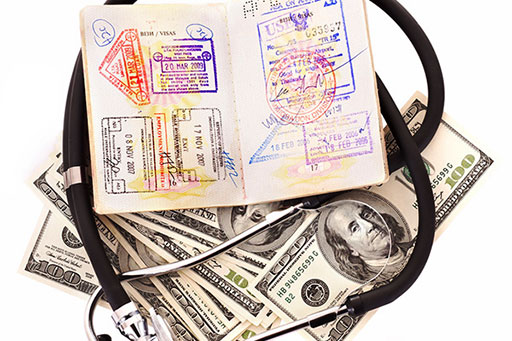
Thailand is one of the world’s most popular medical hubs because it is accessible, affordable and reliable. Tourists traveling to Thailand for its healthcare services have access to various five-star hotel type hospitals that hold Western accreditations, as well as highly-qualified medical professionals, and state-of-the-art medical technology. This article will discuss the most common questions on obtaining a visa for medical purposes.
What type of Thai visa do I need?
Foreign nationals seeking medical treatment in Thailand are regarded as visiting tourists. Therefore, they must obtain a tourist visa prior to their arrival in Thailand. Tourist visa applications can be submitted to any Thai Embassy or Consulate in the foreign national’s home country. The documents required for this process are as follows (please note that the Embassy or Consulate reserves the right to request additional documentation):
- A passport, that is valid for a period of at least 6 (six) months.
- A completed visa application form.
- A recent photograph (4 x 6 cm.) of the applicant.
- Evidence of adequate finances – each Foreign National must have at least 20,000 THB in their bank account. Evidence of travel from Thailand – a fully-paid outbound air ticket.
Tourist visa application fees will cost 1,000 THB each ( fee subject to change without prior notice). All tourist visas are valid for 3 (three) months.
I don't have time to apply for a Thai tourist visa. Can I get a visa-on-arrival if I'm seeking medical treatment?
According to the Ministry of Foreign Affairs, citizens from the following 28 countries are eligible for visa-on-arrival: Bhutan, China, Cyprus, Czech Republic, Estonia, Hungary, India, Kazakhstan, Latvia, Liechtenstein, Lithuania, Maldives, Mauritius, Oman, Poland, Russian Federation, Saudi Arabia, Slovakia, Slovenia, Uzbekistan, Ukraine, Federal Democratic Republic of Ethiopia, Taiwan, Bulgaria, Andorra, Malta, Romania and San Marino.
Tourist visa-on-arrivals are usually valid for 15 (fifteen) days. In order for the visa to be granted, applicants must submit the following documents:
- A passport that is valid for at least 6 (six) months.
- Proof of finances – must be at least 10,000 THB per applicant.
- Proof of travel from Thailand – usually in the form of a fully-paid air ticket, with the departure date not exceeding 15 (fifteen) days after entry.
- Fully filled out application form and a recent photograph measuring 4 x 6 cm.
- 1,000 THB application fee.
I am from one of the countries listed in Thailand's Visa Exemption List. Can I seek medical treatment in Thailand without a visa?
Yes, but you may have trouble extending your stay. Unless you are a Gulf Cooperation Council National, you will not be permitted to enter the country for medical reasons. Individuals from the 52 countries that are allowed to enter Thailand without a visa under the Visa Exemption Rule must leave the country by their expected leave date.
Can I bring any accompanying persons with me?
Yes, as long as the accompanying persons possess an approved tourist visa.
My doctor says my treatment will not be completed prior to my expected leave date and/or visa expiration date. Can I extend my stay?
Foreign Nationals wishing to extend their stay can choose between two options:
- Applying for permission to extend their stay, or
- Applying to permission to change their visa type to a non-immigrant visa for medical purposes.
Those who wish to extend their stay must present medical documentation from their healthcare practitioner verifying that they are undergoing medical treatment. The document must specify what the Foreign National is being treated for, a tentative schedule specifying the time required for treatment, and an explanation to why traveling will be detrimental to a their health. Approved extended-stay applications will be valid for a time not exceeding 30 days.
Those who opt to change their visa type to a Thai non-immigrant (O) visa for medical reasons must submit proof that they are undergoing medical procedures at a licensed medical facility, as well as a doctor's letter specifying the Foreign National's condition and the time required for treatment. Non-immigrant visas are usually valid for a time not exceeding 90 (ninety) days. The application fee for a single-entry visa is 2,000 THB per application, and 5,000 THB per application for a multiple-entry visa.
All applications are to be submitted to the Office of Immigration Bureau. Applications approvals are entirely at the discretion of the Immigration Officer.
How many times can I extend my stay here in Thailand?
You can extend your stay as long as you have adequate documentation. However, all decisions are made solely at the discretion of the Immigration Officer. It may be a better idea to consider applying for a non-immigrant visa (see Thai one-year multiple-entry visa) if you are planning to undergo a longer-term treatment.
Can my accompanying persons apply to extend their stay in Thailand with me until I complete my treatment?
Yes. The Foreign patient’s family members and 1 (one) additional person are allowed to apply to extend their stay in Thailand. Accompanying individuals may apply to extend their stay in Thailand as long as they possess the following documents:
- For family members: A copy of one or more official documents that describe the proof of relationship between patient and individuals – this can be documents such as birth certificates, marriage certificates or house registrations.
- For friends/other individuals: Proof of employment in their home countries, such as an employment contract or letter from employers granting temporary leave
- An Affidavit of support from the Thai hospital and/or the accompanying individual’s Embassy or Consulate.
I am a GCC National. Do I still need apply for a visa if I come to Thailand for medical purposes?
No. Starting from January 2013, patients from Bahrain, Kuwait, Oman, Qatar, Saudi Arabia, and the United Arab Emirates are allowed to obtain medical treatment in Thailand for 90 (ninety) without needing a visa. However, the following documents will need to be submitted to immigration officers upon entry to the country:
- A medical appointment letter from a licensed medical facility.
- Proof of adequate finances such as letters from the bank, and/or proof of health insurance that was obtained from their home countries.
I am a Saudi Arabia National and I want my daughter and maid to stay with me while I undergo surgery in Thailand. Do they need to apply for visas?
GCC Nationals are allowed to bring up to 3 (three) accompanying individuals who are also GCC Nationals. Said accompanying individuals are also allowed to be in Thailand for a period of 90 (ninety) days without a visa. But, they must still present the following documents to the immigration officers upon entry to Thailand:
- An official document showing the relationship between patient and accompanying person.
- Proof of employment in their home country, such as an employment contract.
- An Affidavit of support, prepared by a Thai medical practitioner.
If any accompanying persons are not GCC Nationals, they must obtain a Thai 90-day non-immigrant visa prior to arrival in Thailand.
I have completed my medical treatment, can I continue staying in Thailand until my expected leave date?
Yes. You are allowed to stay in Thailand, strictly as tourists, until you are expected to depart.
This visa processing is very complicated and confusing. Are there any visa experts I can contact?
Yes. It is actually recommended that you consult a visa specialist when applying for a Thai visa to avoid any complications.
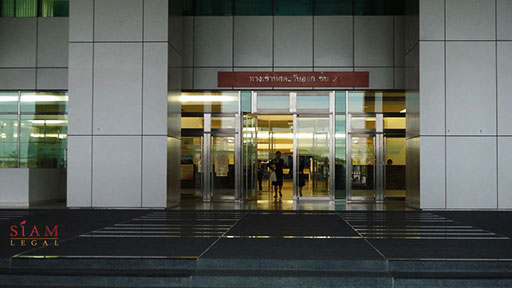
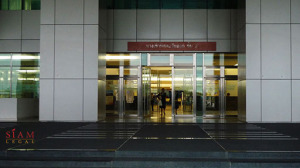
It has been reported in the Nation newspaper that changes are underway in Thai visa and work permit regulations. According to Ms. Issara Wongkusolkij, the chairman of the Thai Chamber of Commerce, the primary change to work permit regulations is the segregation of regulations for unskilled labor and foreign investors. More support will be provided for foreign investors with additional changes to business and foreign visas.
Some changes have already been implemented in the procedures for work permits. A new online option for 90 day reporting is now available. Foreign business person who are coming to Thailand for a meeting no longer are required to obtain a work permit. However a business person who has the power to authorize contracts or approve agreements still require a work permit. Business persons who want to visit an exhibition in Thailand are exempted from getting a work permit but a work permit is required if they open a booth or trade at a fair (work permit exemptions for a state-run exhibition).
With the proper documentation guaranteeing their employment during the period, foreign teachers can not apply for a two year work visa. For Foreign Students, an education visa will still only be good for up to one year if they are studying the same course or subject. Additional changes have been made to allow foreigners who enter Thailand for medical services to obtain a 90 day Thai visa will extensions based on medical necessity.
The process for getting work permits and visa will be stream lined for business persons visiting Thailand on a temporary basis. The use of technology and automation will provide better access for foreigners who cannot communicate in Thai. The changes and amendments are still new but it is hope that they will improve the public's interaction with the Thai government.
You can check what type of Thai visa is appropriate for you by visiting this page.
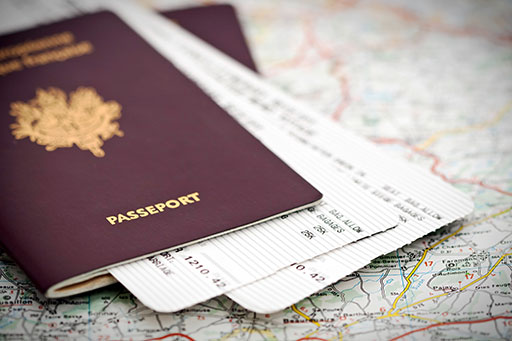
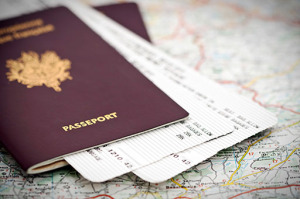
The Thai government has implemented new visa regulations in an attempt to increase tourism while also closing loopholes by immigration scofflaws. With the number of tourist down significantly during the political unrest, the Thai government has made it easy for nationals of the 30-day visa waiver countries to extend their stay to get an extension stamp for an additional 30 days for only 1900 baht. This move is in addition to the implementation of a three-month visa fee waiver for travelers from China and Taiwan.
30-day Extensions for Thai Visa Waivers
In conjunction with the 30-day extensions for visa waivers, the Thai government has closed the loophole, which allowed foreign nationals to bypass Thai immigration law by going on a "visa run." These nationals previously were able to cross over the Thai border and renter Thailand on a new 30-day visa. Automatic extensions for those who repeatedly cross the border will no longer be allowed.
Thailand Education Visa
New rules are also coming into effect for Thai Education visas. For non-formal schools, Non-ED visa holders will only be allowed to remain in Thailand for a year before having to leave Thailand to obtain a new visa. In addition, the study requirements will be raised from a minimum of four hours a week to a minimum of eight hours per week. "A consequences of the eight-hour requirement will be that a course that is currently approved as a three-year course will now only have a value for 18 months. Another aspect is that the tuition fees now will have to be raised because of the extra teaching and the prices for a course will go up."
For more visa options, please visit the Types of Thailand Visa page by ThaiEmbassy.com.
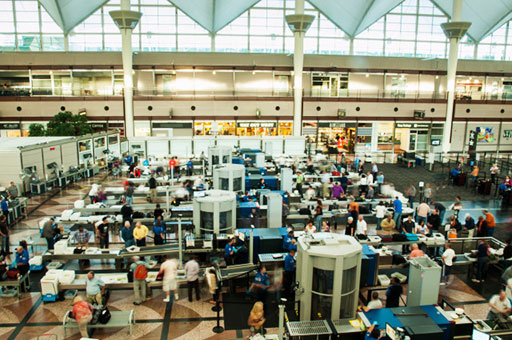
During his weekly address, General Prayuth ordered that the Immigration Police be more flexible in the application of immigration laws for visa runners. The Coup Leader was concerned that a harsh application of the law would damage English schools and the tourist industry.
Currently many visa runners are teaching at English or acting as tour guides for foreign tourist where Thais are deficient in the language such as Korean, Japanese, or Russian. With the coming of the ASEAN Community in 2015 and English as the official language of ASEAN, the Thai population routinely scores one of the lowest in English proficiency among the world. In addition, the recent political turmoil over the past year has had devastating effect the nation’s tourism. The recent call for “flexibility” is a spotlight on the economic realities of the time.
However this has been a shock to the government bureaucracy who have been readying themselves for the new stringent immigration rules. The foreign nationals who use visa runs to stay illegally in Thailand are also illegally working without work permits or paying government taxes. The concern is that the General may have quasi-legitimized the illegal activities of the foreign visa runners.
Other Visa News
- Tourist who run their own business on the internet do not need a work permit. They can stay in Thailand as long as their non-immigrant visa such as a tourist visa or a retirement visa is still valid.
- Thai Immigration Officials will still not grant spousal visas to same-sex couples even if it is legal in their home country. The same-sex couple will need to qualify for a non-immigrant visa separately.
- Student in non-formal education programs such as language schools, meditation courses, or Thai boxing schools can only extend their visa for up to 90 days but cannot stay in their visa for more than one year. If they want to continue their study, they will have to leave the country and apply for a new visa to reenter Thailand. Students who are enrolled in government education institutes can continue to extend their visa for up to one year.
- Volunteers in Thailand can extend their state in Thailand for up to a year if they receive a letter of approval from the Ministry of Social Development and Human Security. Without the letter, they will only be issued a 90 day extension for up to one year.
- Dependents of non-immigrant visa holders can extend their stay in Thailand in one year increments. Children are considered dependents until the become 20 years old unless they have disabilities which prevent them living on their own without assistance.
Source: Chiang Mai City News
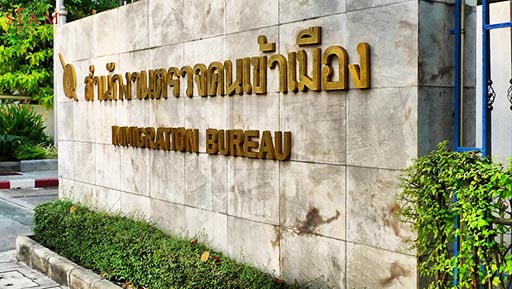
As a continuation of the crackdown on foreign nationals who have bypassed the Thai immigration laws to residing in Thailand, the Thai Immigration Bureau has issued a warning for those who overstayed their visa. Under the proposed regulations foreign nationals who overstayed their visa will be forbidden from re-entering the Kingdom of Thailand for a specific period of time. The following is a summary of the penalties:
Foreign Nationals who overstayed their visa and leave the country voluntarily will face the following ban from reentry:
- If the overstay was for more than 90 days, there is a 1 year ban from reentering Thailand.
- If the overstay was for more than 1 year, there is a 3 year ban from reentering Thailand.
- If the overstay was for more than 3 years, there is a 5 year ban from reentering Thailand.
- If the overstay was for more than 5 years, there is a 10 year ban from reentering Thailand.
*For those who overstayed for less than 90 days, there is still a 500 baht a day fine.
The penalty for overstaying is harsher if the foreign national was apprehended by a Thai public official and was found to have overstayed their visa:
- If the overstay was for less than 1 year, there is a 5 year ban from reentering Thailand.
- If the overstay was for more than 1 year, there is a 10 year ban from reentering Thailand.
All foreigners are who enter the Kingdom of Thailand have to sign a new form entitled "The Acknowledgment of Penalties for Visa Overstay." There is no right to appeal the penalties for a finding of overstays or the penalties.
Local embassies have been issuing warnings to its nationals about the penalties for overstaying their visas. The United States Embassy specifically stated that they will not intervene on behalf of United Citizens who have been denied re-entry at the border or at airports.
Thai Elite Visa
Thailand Elite visa is a special visa aimed for high networth businessmen, digital nomads, retirees, investors, high income individuals, and families looking to move in to Thailand. The Elite member or card holder has special privileges such as VIP treatment at the airport, exclusive spa and golf courses, special discount at major department stores and shopping malls, elite personal assistance, and many more. To learn more if Thailand Elite Visa is the most suitable long term visa for you, just click the link below.
